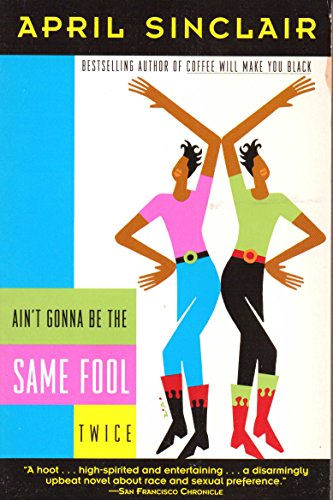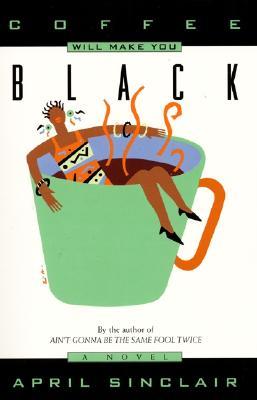April Sinclair picks up right where she left Stevie, the protagonist of Coffee Will Make You Black. Stevie graduated high school in the spring of 1971 amid the rise of the Black Power movement and unspoken investigations of her sexuality. Not sure of her place in things, but certain that she doesn’t like labels or blanket statements, Stevie heads off to college in middle-of-nowhere Illinois to take advantage of a full-ride scholarship to a college with 500 black students on a campus of 20,000.
Ain’t Gonna Be the Same Fool Twice doesn’t spend much time with Stevie’s college years, showing only how the protagonist befriends two other black women and a white French woman, all residents of Stevie’s dorm. Again, Stevie’s feelings for a woman aren’t totally platonic — this time it’s the French woman — and Stevie can’t tell her black friends. She skates around whether she’s allowed to have white friends, let alone a white lover, and how the black community typically reacts to LGBTQ individuals.

While Coffee Will Make You Black has race at the forefront and sexuality in the wing, Ain’t Gonna Be the Same Fool Twice flip-flops that. Stevie points out that she knows white college students who steal all the time, but when she walks into a store, the clerks whisper, “You’ve gotta watch them, they’ll steal anything that’s not nailed down.” Later, Stevie acknowledges that her white roommate, who gets nude on a public beach, doesn’t listen to commands to get dressed. Instead, she dances. Why? Because this woman wouldn’t have to worry that anything she “ever did would reflect upon an entire race of people. She was an individual. She was white.”
And this gets to the crux of Stevie’s life. After college graduation, Steve and two friends head to San Francisco for a vacation. Realized the community there welcomes gays and lesbians, Stevie decides to stay. It’s the summer of 1975. She locates lesbian bars and women-only spaces to find out who she is. But in the end, she always wants to be herself, not a label. Stevie finds the lesbian/gay community tries to make her choose sides, just like fellow black students in high school did, when she realizes she may be bi-sexual. She admits to her new friend Sterling that she’s attracted to men and women:
Sterling smiled. “You have your reputation to consider.”
“I do?”
“Yes, you’re building a portfolio.”
“Why can’t I just be open to whatever feels right?”
“Because, then the next thing you know they’ll be calling you bisexual.”
“That’s so bad?”
“Stevie, everybody hates bisexuals. Lesbians will think you’re just a straight woman experimenting at their expense. And heterosexuals will see you as a nymphomaniac.”
Based on conversations on Twitter, I know bisexual individuals are still often ostracized, so I found Stevie’s experiences searching for identity educational.
April Sinclair captures the 1970s well, likely because she’s from Chicago (like Stevie) and moved to San Francisco Bay (like Stevie). The characters are feminist first and black second, another trait that doesn’t sit right with Stevie because it comes back to labels. People talk about “vibes,” asking Stevie to “just try and tune in to the vibes a person is putting out before [Stevie inserts her] energy into their space. . .” There are hippies and womanists galore — it’s the 70s! — who Stevie navigates.
Because Ain’t Gonna Be the Same Fool Twice explores sexuality, there are many sexual situations and adult language. Sinclair can spin a funny tale, though. It’s not overwhelmingly offensive. Stevie’s grandma, who’s more progressive than Stevie’s mother, gives Stevie advice like “if you can’t be good, be careful.” And in reference to her white afro, she says, “Chile, there might be snow on the chimney . . . but, there’s sho’ nuff fire down below.” This granny is feisty. She’s not too proper to say, “And if he cain’t cut the mustard, he kin least lick the jar.” Sure, I’m blushing (I have some grannies), but I’m also laughing that Stevie’s grandma has clever sayings that allow her to speak openly about sex.
Lastly, April Sinclair writes strong dialogue. Most authors don’t. In fact, some famous authors skip dialogue because it’s so hard. Sinclair has an ear for spoken rhythm, though. Here’s an excellent, funny example of Stevie talking to her friend’s brother, who visits in San Francisco before he moves to Alaska. The exchange begins with him, Buster:
“Why not Alaska? I need to stack up me some dead presidents.”
“So it’s all about the paper?” [asks Stevie]
Buster nodded. “I’ma be working on the pipeline, making some long green.”
“It’s gonna be cold up there.”
“That’s cool, ’cause money’s got all kinds of friends. Heat is one of ’em.”
I highly recommend Ain’t Gonna Be the Same Fool Twice, but you must read Coffee Will Make You Black first.


Just from the bits you’ve shared, I can see that Sinclair writes well, and that the dialogue is strong. It sounds as though this raises some important issues of identity, too, that go beyond race. Interesting commentary on how humans like to put things and people into categories…
LikeLike
I thought I remember reading that we like to categorize things because it helps our brains identify and sort out what we see faster. It’s a weird survival sort of thing that isn’t useful when we’re not living in the woods and hunting for berries.
LikeLiked by 1 person
This reminds me of a few books I read in the 70s myself, like Rubyfruit Jungle by Rita Mae Brown, similar but from a white perspective. So it might be interesting to read this one, for the flip side.
LikeLike
Definitely! For some reason, in the past year I keep landing on books from the 1970s, which was a decade I didn’t know much about. I feel like what’s happening in the 70s in the books I read is what I always thought was happening in the 1960s.
LikeLike
You are so right! I think the Sixties only happened in London and San Francisco, and maybe Paris – I don’t think they arrived anywhere else until the Seventies. There are places in Scotland that are still waiting… 😉
LikeLike
[…] recommended! I also found that April Sinclair wrote a follow-up novel, Ain’t Gonna Be the Same Fool Twice, which I immediately […]
LikeLike
I didn’t realize that some famous authors avoid dialogue, but that makes sense because it is hard to pull off.
I really like the sound of this book because it crystallizes a few things about race for me-one of them being that people of minority groups struggle to be individuals because people see their actions as ‘speaking for everyone’ in that group, which I could imagine is incredibly frustrating.
LikeLike
It’s funny that I read a book by Zora Neale Hurston right around the same time as I read April Sinclair because Hurston was ostracized and criticized for saying she is an individual. Her expression to sum it up was “my skin folks, not my kin folks.”
LikeLiked by 1 person
Sounds like you found a book with great dialogue! Wonderful! This one does sound a bit funny. Is the first one (Coffee Will Make You Black) as funny? I really like the cover art of the books – those girls look like they’re having fun and the covers have a sense of whimsy to them.
LikeLike
They are both funny, actually! Not comedies, but the characters can be funny naturally.
LikeLike
Us guys at the end of the sixties and beginning of the seventies had trouble with women who were feminists first and socialists second. And we would have had the same attitude with colour, except we were all white. The Revolution was going to fix everything! Right?
LikeLike
Great review! I remember enjoying these books even if I don’t remember much else!
LikeLike
Oh! I didn’t realize you had read both of them. I thought you only read the first one. They can be pretty racy. How old do you think you were when you read them?
LikeLiked by 1 person
Probably 18 or 19. I could handle it. 😉
LikeLiked by 1 person
I love when an author can write snappy dialogue. I can get all kinds of tangled in long-winded prose, but the right kind of dialogue can really help me get into the mindset of a character. Great review!
LikeLike
Thanks so much, Alicia! Have you read any books with memorable dialogue lately? Whenever I read YA, I feel like most of the book is dialogue. I wonder why that is?
LikeLiked by 1 person
There’s always lots of dialogue when it comes to the contemporaries. I don’t think many YA novels are prone to purple prose. The pacing is different, so I think this is why. Of course there are the exceptions. Last snappy dialogue for me was Maurene Goo’s The Way You Make Me Feel, I think.
LikeLike
Nice! I remember you writing about that one.
LikeLiked by 1 person
These do sound a little racy, so perhaps not books I would read! However, I do like the excerpt you chose. Sinclair seems to have great control over her writing. She says so much in that small piece of dialogue!
LikeLike
I know you tend to read more fantasy, so I don’t see you reading Sinclair either. Do you ever read Mercedes Lackey?
LikeLike
No, I think someone told me Lackey was racy, so I always avoided her books. 😉
LikeLike
I can’t think of anything racy in them in particular…. 🤔
LikeLike
I don’t know, never having read them! Haha! Maybe I should give them a try! 😀
LikeLiked by 1 person
The discussion about bisexuality reminds me of the conversation I had with my son not long ago about the girls in his class. He says that the girls are vocal about their sexual orientations, which surprised me a little because they are only in grade 9. I would have thought some of them would still be working that out, or feeling private about it. But the good thing is… it seems to be no big deal (including the girl who said she was bi). So we might be heading in the right direction – yay!
An interesting thing about it, though, is that the boys don’t seem to join in. I don’t know if it’s because they’re just a little behind at that stage, or if it’s something else?
LikeLike
I wonder if they’re bisexual that they feel not masculine AND not gay, so it doesn’t fit, whereas people seem to think bisexual girls are just down to get down. When we’re talking about sexuality, I’m really puzzled as to why everyone jumps right to thinking about sex. In a lot of cases, maybe especially in high school, it’s about having a crush, just like everyone else. I’m glad high school kids are talking about sexuality–I remember them very much talking about it–but I also hope that the kids realize it can be a journey. Some people decide they’re not lesbian, they bi, or they’re not bi, they’re asexual, etc.
LikeLiked by 1 person
I’m glad they’re talking about it, too. And I’m glad my son was talking to *me* about it!
LikeLiked by 1 person
[…] Will Make You Black and Ain’t Gonna Be the Same Fool Twice by April […]
LikeLike
[…] on an Ordinary Day by Pearl Cleage. The cover reminded me so much of Coffee Will Make You Black and Ain’t Gonna Be the Same Fool Twice by April […]
LikeLike